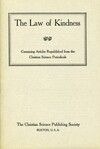

Are you sure?
This bookmark will be removed from all folders and any saved notes will be permanently removed.
THE LAW OF KINDNESS
When for purely personal reasons laws are made by men, these human enactments often seem to other men to be unreasonable and arbitrary, and they are sometimes resisted. Hence there has grown up a wrong sense of law, and when we speak of the law of God it is frequently conceived to be an arbitrary demand on man of the personal will of the almighty Lawmaker. But when we rightly understand God as Principle, and that "righteousness and judgment are the habitation of his throne," we then conceive of God's law as the uniform and consistent expression of His true nature, and no longer think of it as a rule of action enforced on man and supported by penalties for disobedience. When one becomes assimilated to God, is harmonious with divine Principle and accordant with the nature of the creator, then in his life appears the uniform occurrence of characteristics such as were manifest in Christ Jesus, who came not to do his own will, but to express the will or character of God. Such a life manifests the divine law, which is ever the same. "The world passeth away, and the lust thereof: but he that doeth the will of God abideth for ever."
Let us examine one characteristic which may be so regularly active in a man's life that it becomes a law. Kindness does not seem to be natural to men, but it may become, as they say, "second nature." Kind action may be of such uniform occurrence that the man expresses the law of kindness. There are yet to be found unsocial and savage conditions where every man's hand is against his neighbor, but even among barbarians, whether in civilized lands or uncivilized, there is to be found a sense of kinship. The man who seems to be the conscienceless destroyer of the well-being of many, may be considerate to his own family. He may regard the ties of blood, even as animals do that fight for their young and nourish them. But men are capable of higher things than the wolf, the savage protector of his household. In men there is a common nature, a universal kinship, a similarity of relationship to true life; and the individual who reaches a sense of universal friendliness and world-wide good-will, perceives this indestructible relationship and is lifted thereby into the permanent and heavenly sensed life.
Professor Drummond, in his book "The Greatest Thing in the World," asks the question, "Have you ever noticed how much of Christ's life was spent in doing kind things — in merely doing kind things?" In the life which represents to us the normal life for man this characteristic kindness has not been sufficiently noticed by good men, else the query of the child would not occur, "Where in heaven will God put the men who are good but not kind?" The observant Peter seems to have noticed the need of something more than austere righteousness, for he says, "Add to your . . . godliness brotherly kindness." How great is the need in the world for ordinary kindness! We applaud kindness in the great emergencies, as when after the cruelty of battle the devoted nurses minister to the suffering, supplying their needs without asking on which side in the conflict they stood, — just ministering to them all as to men in need of friendliness.
Enjoy 1 free Sentinel article or audio program each month, including content from 1898 to today.
JSH Collections
This article is included in:
1912 - PAMPHLET
The law of kindness
JSH-Online has hundreds of pamphlets, anthologies, and special editions for you to discover.

June 6, 1908 issue
View Issue-
THE LAW OF KINDNESS
REV. WILLIAM P. MC KENZIE.
-
"WHAT HAST THOU IN THE HOUSE?"
CONSTANCE SKINNER.
-
FEAR NOT
HELEN L. YOUNG.
-
TESTING THOUGHT
ADA J. MILLER.
-
LONGING
J. E. Breed
-
I do not quarrel with people who call Jesus God, if by...
Rev. N. S. Hoagland
-
False consciousness, or the false sense of life, is of the...
Rev. G. A. Kratzer
-
Is there Scriptural authority for healing disease by means...
Judge Septimus J. Hanna
-
THE LECTURES
with contributions from John Ellis Sedman, B. G. Carpenter, W. L. Swan, James M. Taylor, T. E. Boland, Frank Newell, W. R. Rathvon
-
MRS. EDDY TAKES NO PATIENTS
Editor
-
"THE DOCTOR IN POLITICS."
Archibald McLellan
-
"HIS HANDIWORK."
John B. Willis
-
FAITH OVERCOMING FEAR
Annie M. Knott
-
LETTERS TO OUR LEADER
Edward A. Kimball, Mary B. G. Eddy, Alfred Farlow, Anna T. Robinson, Howard L. Cheney, Sydney F. Miles, Edith M. Young, J. V. Dittemore, R. A. Gilliam, Frank R. Kinsley, Rose Festner
-
Twelve years ago, when Christian Science was brought...
Annie L. Sturtevant
-
It is now about a year since the Christian Scientists came...
William Letchford
-
Several years ago, while in Jacksonville, Fla., I was,...
Harriet E. Frazier
-
With my heart full of gratitude and love to our beloved...
Lillian Walker
-
For the countless blessings of Christian Science I would...
Mabel M. Beeson
-
Since Father Time stands still, and heaven is here,...
Cassius M. Loomis
-
FROM OUR EXCHANGES
with contributions from Frederick Campbell, Albert Parker Fitch, Roosevelt


